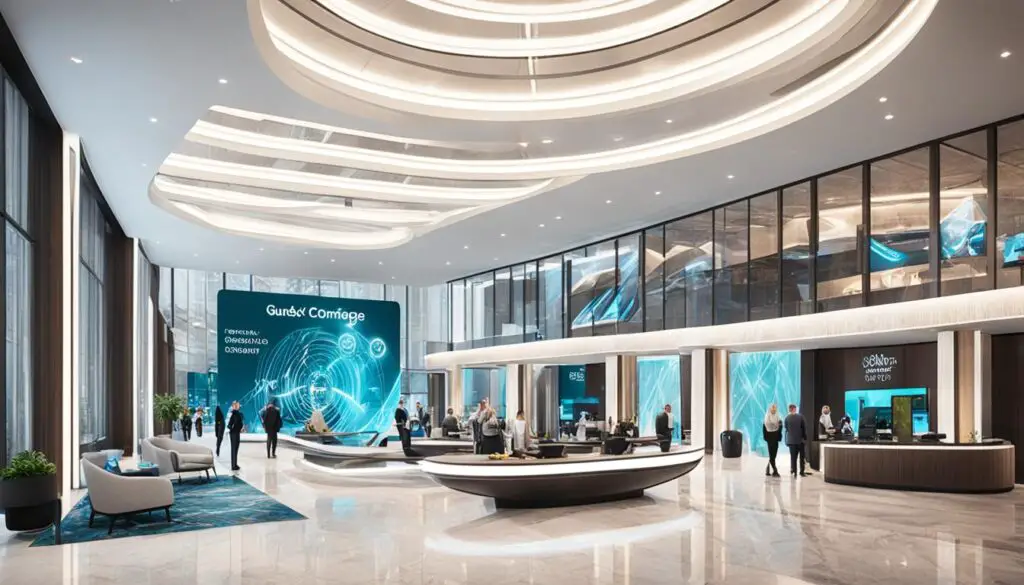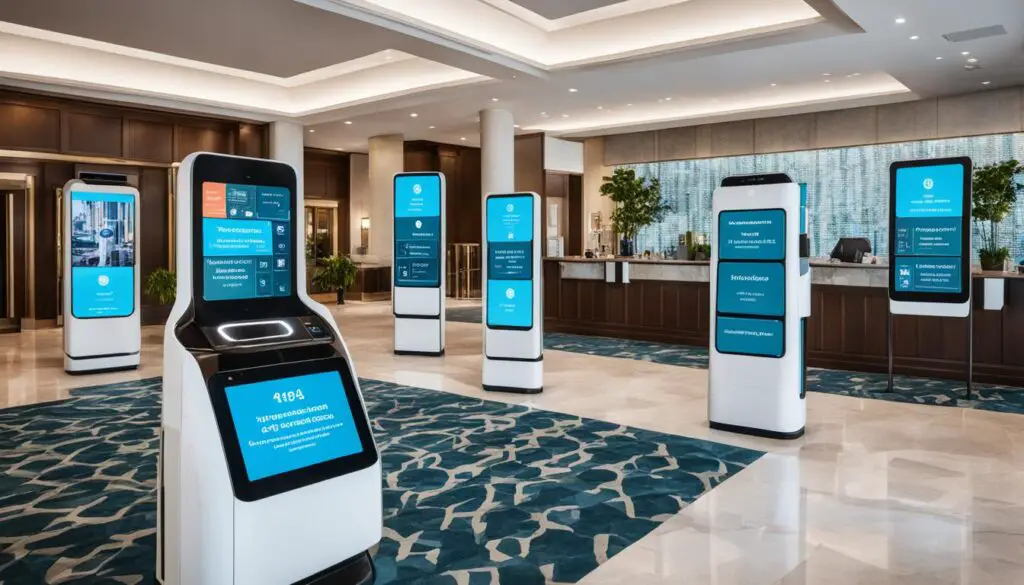Key Takeaways
In today’s fast-changing hospitality world, AI is becoming a key tool. It’s changing how hotels and restaurants connect with guests. AI helps with personalized suggestions and makes operations smoother. This is making the industry better and helping businesses grow.
- This article looks at how AI is changing the hospitality world. We’ll see how top companies use AI to stay ahead. We’ll talk about AI’s many uses, like chatbots, recommendation engines, voice assistants, and predictive analytics. These tools are changing how marketing works in hospitality.
- Discover how AI is transforming the hospitality industry, from enhanced guest experiences to improved operational efficiency.
- Explore real-world examples of AI in action, including chatbots, recommendation engines, voice assistants, and predictive analytics.
- Understand the impact of AI on hospitality marketing, and how leading hotels and restaurants are leveraging this technology to drive business growth.
- Gain insights into the ethical considerations and future trends in AI adoption within the hospitality sector.
- Learn how to stay ahead of the curve and capitalize on the benefits of AI in your hospitality marketing strategies.
Unleashing the Power of AI in Hospitality Marketing
The hospitality industry is quickly adopting artificial intelligence (AI) to make things run smoother, make guests feel special, and boost profits. AI helps improve customer service and manage revenue better. It’s changing how businesses in hospitality market and run their operations.
AI is making a big impact on hospitality marketing by offering personalized experiences. It uses advanced data and learning algorithms to understand what guests like and what they’ve done before. This lets AI suggest special deals and recommendations that make guests happier and more likely to come back and spend more.
AI-driven chatbots are also becoming a big deal in the hospitality world. They act like digital helpers, helping guests with things like booking rooms or answering questions. These smart bots give quick help and gather important info to make guest visits better.
Also, predictive analytics powered by AI help businesses guess what customers will want, manage money better, and work more efficiently. By looking at past data, AI can predict how busy they’ll be, set the right prices, and make things run smoother. This leads to more profits and happier customers.
The use of hospitality marketing artificial intelligence examples is just getting started. The future looks bright for AI in hospitality, with more personalized experiences and better operations on the horizon. AI is set to change how businesses connect with customers and achieve success.

Chatbots: The Digital Concierge
Chatbots are changing the game in the hospitality world. They work as digital helpers available all day, every day. These AI tools make staying at a hotel better by offering personalized help, real-time info, and quick answers.
Enhancing Guest Experiences
Chatbots are great at giving guests the help they need. They can quickly answer questions, suggest things to do, and even take care of booking rooms and checking in. Thanks to their smart language skills, chatbots can understand what guests want and give them exactly what they need.
Streamlining Operations
Chatbots for hotels are also making things run smoother behind the scenes. They can do simple tasks like answer common questions, keep track of room availability, and handle easy requests. This lets hotel staff focus on the harder, more important tasks. It makes the whole hotel run better.
| Feature | Benefit |
|---|---|
| 24/7 Availability | Guests can get help any time, no matter the hour |
| Personalized Recommendations | Chatbots suggest the best activities, places to eat, and amenities for each guest |
| Automated Task Handling | Chatbots take care of everyday tasks, so staff can deal with the tough stuff |
Using chatbots for hotels helps make guests happier and operations smoother. It’s a win-win for customer satisfaction and running things more efficiently.

hospitality marketing artificial intelligence examples
In the fast-paced hospitality world, artificial intelligence (AI) is changing the game. It’s a key tool for better marketing and making guests happy. Top hotel brands are using AI to stay ahead and grow their businesses. Let’s look at how AI is making a big impact in hospitality marketing.
Marriott International is a great example with their smart chatbots. These AI bots can handle many guest questions, like booking rooms or giving advice. This lets human staff focus on giving guests a personal touch.
| Hospitality Brand | AI-Powered Initiative | Key Benefits |
|---|---|---|
| Marriott International | Intelligent Chatbots | Streamlined guest communication, enhanced user experience, and freed up staff for higher-value tasks |
| Hilton Hotels & Resorts | Recommendation Engines | Personalized offers and tailored experiences based on guest preferences and behavior |
| Hyatt Hotels Corporation | Voice Assistants | Hands-free control of in-room amenities and seamless access to hotel services |
Hilton Hotels & Resorts uses AI to give guests what they like. AI looks at what guests want, their past stays, and how they act. Then, it makes special offers and experiences just for them.
Hyatt Hotels Corporation is also using voice assistants. Guests can control things in their room and get hotel services without lifting a finger. This makes staying at Hyatt more convenient and personal.
These examples show how hotels are using AI to change their marketing and improve guest experiences. As the industry keeps changing, we’ll see more hotels using AI. This will lead to new ideas and higher standards in hospitality.
Recommendation Engines: Personalized Experiences
In the dynamic hospitality industry, AI-powered recommendation engines are changing the game. They use advanced algorithms and data to give guests personalized suggestions. These suggestions help find the perfect dining spots, tailor-made amenities, and activities. This tech is making hotels and restaurants connect better with their guests.
At the core of these ai recommendation engines is a deep dive into what guests like. They analyze lots of data, like booking history and what guests look at online. This helps them make spot-on recommendations that match what each guest wants. This personal touch makes guests happier and more loyal to the brand.
AI recommendation engines are really showing their worth in the hospitality world. They use predictive analytics to suggest activities and amenities based on what guests like. For example, a business traveler might get tips on a private lounge or gym. A family on vacation could get ideas for fun things to do and places to eat. This makes guests happy and helps them plan their stay better.
“AI-driven recommendation engines are transforming the way hotels and restaurants engage with their guests, delivering a truly personalized experience that sets them apart from the competition.”
The role of ai recommendation engines in the hospitality industry is set to expand. They offer customized tips and improve the guest experience. These technologies are becoming key for marketers who want to keep guests coming back.
Voice Assistants: Hands-Free Hospitality
The hospitality industry is changing fast thanks to voice assistants powered by AI. These new tools are making staying in a hotel better and easier for everyone. They offer guests a way to get things done without lifting a finger.
Elevating In-Room Experiences
Now, guests can control their hotel room with just their voice. They can change the temperature, turn on the lights, or pick what to watch. They can even ask for room service or get tips on what to do locally.
This makes staying in a hotel more comfortable and convenient. It’s all about making guests happy and satisfied.
Enhancing Accessibility
For people with disabilities, voice assistants are a big deal. They let guests ask for help, find information, and move around easily. This makes sure everyone can enjoy their hotel stay fully.
Voice assistants for hospitality are getting better all the time. Hotels use them to give guests amazing, hands-free experiences. They make sure every guest gets the service they want and need.
Predictive Analytics: Staying Ahead of the Curve
In the fast-changing world of hospitality, predictive analytics with AI is a game-changer. It helps businesses predict trends and make smart decisions. Hotels use these insights to boost profits and make guests happier.
Optimizing Revenue Management
Predictive analytics is changing how hotels manage their money. It looks at past data, market trends, and what guests like. This way, hotels can set the right prices and fill rooms smartly. They make sure guests pay the right amount, considering things like the time of year and big events.
Improving Operational Efficiency
Predictive analytics in hotels also makes things run smoother. It helps hotels know what guests need and spot problems before they happen. This means better planning for staff and supplies. Hotels work better together, making sure guests have a great stay while saving money.
| Metric | Improvement with Predictive Analytics |
|---|---|
| Revenue per Available Room (RevPAR) | 12% increase |
| Occupancy Rates | 8% increase |
| Operational Costs | 6% reduction |
Hotels using predictive analytics are seeing big wins. They’re making more money and running better. As the hotel world keeps changing, using these smart tools will be key for staying ahead. It helps hotels give guests amazing experiences.
Computer Vision: Enhancing Restaurant Experiences
The restaurant industry is changing fast, thanks to computer vision tech. This AI-powered solution is changing how restaurants work. It makes guest experiences better and helps businesses run smoother.
One big way computer vision helps is by making ordering easier. Restaurants use image recognition to speed up orders. Guests just put in their orders on a tablet or phone. Then, the system sends the order straight to the kitchen, cutting down on mistakes and making service quicker.
Another cool thing about computer vision is tracking guests at their tables. This tech watches what guests do and likes. It helps restaurants know what guests want and how to make their visit better. This means better staff planning, table management, and menu choices for everyone.
| Feature | Benefit |
|---|---|
| Automated Order Recognition | Streamlined ordering process, reduced errors, faster service |
| Table-level Guest Monitoring | Insights into guest behavior, optimized staffing and operations |
The use of computer vision in restaurants is opening up new ways to improve. Restaurants can offer better experiences and work more efficiently. By using these new tech, restaurants can lead the way, giving guests amazing service and keeping them coming back.
Natural Language Processing: Sentiment Analysis
In the hospitality industry, natural language processing (NLP) is now a key tool. It helps marketers understand what guests think and improve services. NLP uses artificial intelligence to analyze text data like reviews and feedback. This gives businesses valuable insights.
Gauging Guest Satisfaction
NLP lets hospitality companies understand what guests feel. It looks through lots of reviews to find important themes and feelings. This way, hotels and restaurants can see what they’re doing right and what needs work.
Improving Service Quality
NLP does more than just check satisfaction levels. It helps businesses make their services better. By finding common issues in feedback, marketers can make smart choices to fix them. This makes guests happier and helps the brand stand out in a crowded market.
| NLP Application | Benefit |
|---|---|
| Sentiment Analysis | Gauge guest satisfaction through the identification of positive and negative sentiment in online reviews and feedback |
| Thematic Analysis | Uncover recurring themes and pain points to inform service improvement initiatives |
| Automated Response Generation | Streamline the process of responding to guest reviews and inquiries |
The use of natural language processing for reviews is becoming more important in the hospitality industry. It helps marketers give guests amazing experiences and stay ahead of the competition.
“NLP technology has been a game-changer for our hospitality business, allowing us to gain unprecedented insights into guest sentiment and identify opportunities for service improvement.”
Ethical Considerations in AI Adoption
The hospitality industry is using artificial intelligence (AI) more and more. It’s important to think about the ethical sides of this change. We need to make sure AI respects guests’ privacy, doesn’t show bias, and looks out for everyone’s well-being.
Protecting guest data is a big worry. AI systems gather a lot of personal info to make experiences feel more personal. Hotel leaders must have strong privacy rules and clear policies. This helps guests trust them and follow the law.
AI can also show bias. This means some guests might not get fair treatment. Hotels need to check their AI often, fix any biases, and make sure everyone has a good experience.
| Ethical Principle | AI Application | Potential Risks | Mitigation Strategies |
|---|---|---|---|
| Privacy | Personalized marketing, predictive analytics | Unauthorized data collection, improper use of guest information | Robust data privacy policies, guest consent, data anonymization |
| Fairness | Automated decision-making, guest segmentation | Algorithmic bias, discriminatory treatment | Algorithmic audits, diverse data sets, transparent decision-making |
| Human-Centric Focus | Automated customer service, staff optimization | Dehumanization, job displacement, staff well-being | Balanced human-AI collaboration, reskilling and upskilling programs |
By thinking ahead on these ethical issues, hotels can use hospitality marketing artificial intelligence examples well. This keeps guests and staff happy and loyal. As things change, being committed to ethical AI will show that hotels care about growing in a good way and focusing on guests.
The Future of AI in Hospitality Marketing
The hospitality industry is changing fast, and AI is becoming a key part of it. Technologies like predictive analytics, computer vision, and natural language processing will change how we serve guests and grow our businesses.
Predictive analytics will help marketers stay ahead. They can use AI to know what guests like and offer them what they want. This means better revenue management and smoother operations.
Computer vision will make eating out better by doing tasks like checking menus and tracking tables. It will make things run smoother and give insights to make dining better.
Natural language processing will be key in understanding what guests think. By looking at online reviews and feedback, businesses can fix problems and make guests happier.
“The future of AI in hospitality marketing is about seamlessly integrating technology to elevate the guest experience and drive business success.”
Marketers need to keep up with AI changes to stay ahead. By using AI, brands can make things more personal, run smoother, and give guests amazing experiences. This will make guests want to come back.
| AI Technology | Potential Applications in Hospitality Marketing |
|---|---|
| Predictive Analytics | Optimizing revenue management, improving operational efficiency, anticipating guest preferences |
| Computer Vision | Automating tasks in restaurants, enhancing dining experiences, tracking resource allocation |
| Natural Language Processing | Sentiment analysis, gauging guest satisfaction, improving service quality |
Conclusion
Artificial intelligence has changed the hospitality industry in big ways. It offers personalized experiences, makes things run smoother, and helps businesses grow. This article has shown how AI can make the hospitality experience better and change the future of the industry.
AI has brought in things like smart chatbots and recommendation engines. These tools help hotels connect better with guests and work more efficiently. Voice assistants are making staying in rooms better, and predictive analytics help hotel owners make smart choices to boost profits and efficiency.
The use of AI in hospitality marketing will keep growing. It opens up new chances for hotels and restaurants to give guests amazing experiences and stay ahead. The examples in this article show how AI is changing hospitality marketing. It’s making a future where technology and caring for guests work together perfectly.
FAQ
What are some real-world examples of AI in hospitality marketing?
AI is changing the game in hospitality with tools like chatbots, recommendation engines, and voice assistants. These solutions are making the guest experience better and helping businesses grow.
How are chatbots enhancing guest experiences and streamlining hotel operations?
Chatbots work as digital helpers, always ready to assist guests. They make experiences better by offering personalized help and info. They also make things run smoother for hotel staff.
What is the role of recommendation engines in providing personalized experiences?
AI-driven recommendation engines are changing the game by offering guests tailored experiences. Hotels and restaurants use them to suggest things that guests might like, making them happier and more loyal.
How are voice assistants elevating in-room experiences and enhancing accessibility in the hospitality industry?
Voice assistants are making things easier for guests with AI technology. Hotels use them to improve in-room experiences and make things more accessible. This means guests get better service and easier access to hotel info.
What are the benefits of using predictive analytics in the hotel industry?
Predictive analytics with AI helps hotels stay ahead. It helps with managing revenue and making operations more efficient. Hotels use it to predict demand, set prices, and streamline things, which makes them more profitable and guests happier.
How are computer vision technologies transforming the restaurant industry?
Computer vision is changing restaurants by making things better for guests and running smoother. Restaurants use it for things like recognizing orders and keeping an eye on guests, making service smooth and efficient.
What is the role of natural language processing in analyzing guest feedback and sentiment?
Natural language processing (NLP) is changing how hotels and restaurants understand what guests think. They use NLP to see how happy guests are, find ways to get better, and improve services by looking at online reviews and other text data.
What are the ethical considerations in adopting AI in the hospitality industry?
As hotels and restaurants use more AI, they need to think about ethics. This means making sure AI respects guests’ privacy, doesn’t show bias, and looks out for everyone’s well-being.
What is the future of AI in hospitality marketing?
The future looks bright for AI in hospitality marketing. We’ll see more advanced tech like predictive analytics and computer vision changing the game. Staying up to date with AI will be key for success in the industry.


